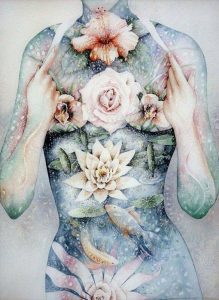 Our Moving into Meditation class continues to draw inspiration from Frank Ostaseski’s The Five Invitations, a wonderful book about “what death can teach us about living fully.” If you would like to learn more about Frank – his moving personal history – and his book, you can read Maria Popova’s Brain Pickings article, The Five Invitations: Zen Hospice Project Co-founder Frank Ostaseski on Love, Death and the Essential Habits of Mind for a Meaningful Life. We also drew from Mark Coleman’s book, Make Peace With Your Mind. Mark is a mindfulness teacher, wilderness guide and author. Both works focus, in part, on self judgment. They offer insights and practices on how to free ourselves from the inner critic that drains our lives of joy and spontaneity.
Our Moving into Meditation class continues to draw inspiration from Frank Ostaseski’s The Five Invitations, a wonderful book about “what death can teach us about living fully.” If you would like to learn more about Frank – his moving personal history – and his book, you can read Maria Popova’s Brain Pickings article, The Five Invitations: Zen Hospice Project Co-founder Frank Ostaseski on Love, Death and the Essential Habits of Mind for a Meaningful Life. We also drew from Mark Coleman’s book, Make Peace With Your Mind. Mark is a mindfulness teacher, wilderness guide and author. Both works focus, in part, on self judgment. They offer insights and practices on how to free ourselves from the inner critic that drains our lives of joy and spontaneity.
Guided Relaxation
Welcome . . . enjoy this relaxed awareness . . . this experience of being . . . gradually coming to touch the silence within . . . make peace with your mind . . .
Here we are together . . . exploring being, sharing being . . . finding common ground with one another . . . a sense of belonging as we honor all parts of ourselves . . . teaching each other a bit more about respecting difference . . . practicing inclusivity . . . wholeness . . .
In MEDITATION: CALMING THE MIND (Excerpt) Bob Sharples advises:
 Don’t meditate to fix yourself, to improve yourself, to redeem yourself; rather, do it as an act of love, of deep warm friendship to yourself. In this way there is no longer any need for the subtle aggression of self-improvement, for the endless guilt of not doing enough.
Don’t meditate to fix yourself, to improve yourself, to redeem yourself; rather, do it as an act of love, of deep warm friendship to yourself. In this way there is no longer any need for the subtle aggression of self-improvement, for the endless guilt of not doing enough.
It offers the possibility of an end to the ceaseless round of trying so hard that wraps so many people’s lives in a knot. Instead there is now meditation as an act of love. How endlessly delightful and encouraging.
Instead there is now . . . meditation as an act of love . . . endlessly . . . encouraging . . .
Making peace . . . by shifting from living with attachment to the judgmental mind to living with kindness . . . to embrace all of who we are . . . Can we make “a radical shift in our inner world, to allow ourselves to welcome into our heart the parts of ourselves we have denied, repressed, or rejected?
. . . our very life has a way of encouraging us to deal with our disowned parts and hidden selves. In all of life there is a yearning for integration.
Frank Ostaseski writes: “Often in our most vulnerable moments, when we would benefit from tenderness, we club ourselves with self-judgment. . . .
. . . The pursuit of perfection is learned early on & for most of us becomes a lifelong addiction. It is an ego based quest that easily can eclipse the soul’s journey to wholeness. . . . It is the primary obstacle to self-acceptance, trust & expansion of our dynamic potential. It stops growth, arrests inner development, steals our power & makes negative self-talk the norm. . . . the judge impedes our ability to connect & empathize with other people.
Embracing wholeness is a loving act of reclamation, a . . . way of meeting life.
. . . as we mature we have access to a less reactive & more discerning wisdom that can . . . [serve] as a reliable & creative guide in our lives.”
 Right now: Can you trust your heart to know how you feel? . . . to be empathic and compassionate in relationships? Do you have faith in your intuitive gut sense? That it will guide you in new encounters? Can you trust your ability to reason and evaluate? To navigate through life?
Right now: Can you trust your heart to know how you feel? . . . to be empathic and compassionate in relationships? Do you have faith in your intuitive gut sense? That it will guide you in new encounters? Can you trust your ability to reason and evaluate? To navigate through life?
Frank suggests we place trust and faith – in our innate goodness – it is here we find an alternative to the inner critic, the self-judge. It’s found in the movement from judgment to discernment. . . . Discernment makes space, helps us to have perspective, and allows the wholeness of our humanity to be . . . Discernment helps wisdom to emerge and enables us to choose a more beneficial future. Our discerning wisdom is a kind, more objective voice . . . it can differentiate and intelligently guide us forward.
Unlike analytical wisdom that needs to be trained & developed over time, we also have an innate wisdom. . . . a self-revealing wisdom nature that we can attune to through meditation. . . . we all have access to this inner wisdom if only we listen carefully to what it has to offer.
We can bring self-acceptance forward . . . we can befriend ourselves . . .
Poet e.e. cummings said: “it takes courage to grow up and become who you really are.”
 In practical terms it involves . . . Telling the emotional truth, expressing disinterest in the critic’s advice, using humor, staying connected to your physical center, harnessing your strength – all strategies are meant to restore our contact with the dynamic expansiveness that is our essential nature. When we have successfully disengaged from the critic, we may feel a shift in physical energy, perhaps a release of tension, a free flow of breath. Emotionally we may feel increased confidence and compassion for what hurts. Mentally we may have more clarity and less confusion. . . . It takes practice.
In practical terms it involves . . . Telling the emotional truth, expressing disinterest in the critic’s advice, using humor, staying connected to your physical center, harnessing your strength – all strategies are meant to restore our contact with the dynamic expansiveness that is our essential nature. When we have successfully disengaged from the critic, we may feel a shift in physical energy, perhaps a release of tension, a free flow of breath. Emotionally we may feel increased confidence and compassion for what hurts. Mentally we may have more clarity and less confusion. . . . It takes practice.
From Mark Coleman:
[We] pay attention to our unique gifts, skills and qualities.
[We] notice when we act in positive, kind, caring ways.
[We] observe the moments of quiet joy and ease.
[We] take in those times when we are spontaneously generous to others.
[We] notice our humanity and our capacity to enjoy life.
“The more you can acknowledge the goodness of an action, the more you will realize it comes from your innate goodness – your authentic nature.”
